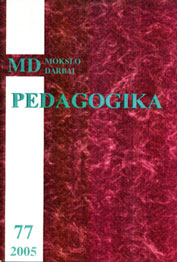Jaunuolių psichosocialinės raidos ypatumai dėl šeimoje patirtos agresijos
Characteristics of Youngesters' Psycholosocial Development as a Result of Aggresion Experienced in the Family
Author(s): Brigita KairienėSubject(s): Education
Published by: Vytauto Didžiojo Universitetas
Summary/Abstract: A basis of this research is an analysis of the negative behavior of aggressive parents with their children. The outcomings of aggression experienced in youngster's family are analyzed through their extraordinal psychosocial development, which is estimated according to the criteria: the kid's happiness and safety. The research goal is to define how youngsters who experienced parents aggression, are happy and safe in their families. Hypothesis: aggression that youngsters experienced in the family has a negative effect on their psychosocial development. The object of research is psychosocial development of 17 years old youngsters who experienced parents' aggression. Empiric research defines that a youngster's experience appearing as a result of their parents' aggressive behavior in the family is seen in the characteristics of their psychosocial development: unhappiness in families (the level of happiness is on the contrary to the frequency of experienced aggression), physical and psychical unsafeness (the frequency of experienced aggression by youngsters who haven't felt safely at home, is larger than of those who can feel safe at home). The statistical reliability of frequency of experience of parents' aggressive behavior relation with the happiness and safety experiences allows concluding that aggressive behavior of parents with children not only affect the family life in a disfunctional way, i.e. impede to realize educative, emotional functions, but also hamper the kid's self-expression.
Journal: Pedagogika
- Issue Year: 2005
- Issue No: 77
- Page Range: 119-123
- Page Count: 6
- Language: Lithuanian

